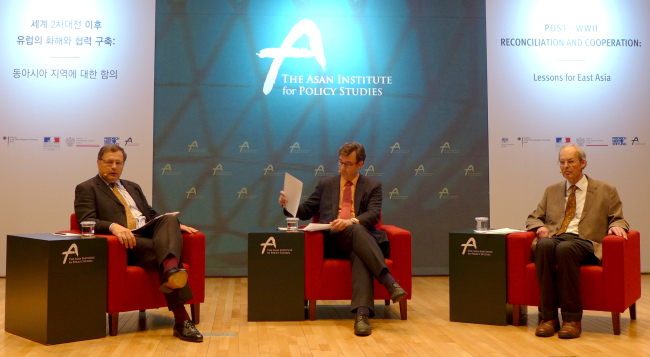Seventy years after the end of World War II, reconciliation efforts among the once-enemy countries of Europe and Asia have taken divergent paths, with the former achieving continental integration and the latter trapped in historical disputes.
Europe’s former foes put their bloody history behind to accomplish political, economic and social confederation through the European Union established in 1993.
East Asia, on the other hand, has been mired in geopolitical tensions despite its integrated economies, a situation described as the “Asian Paradox.”
The Asan Institute for Policy Studies, together with the German, French, Polish and British embassies, held the “Post-WWII Reconciliation and Cooperation: Lessons for East Asia” conference Wednesday, inviting diplomats and scholars to share Europe’s lessons.
 |
British Ambassador Charles Hay (left) moderates a panel beside Etienne Rolland-Piegue (center), deputy head of mission of the French embassy, and Kent University professor Hugh Miall at the “Post-WWII Reconciliation and Cooperation: Lessons for East Asia” conference at the Asan Institute for Policy Studies in Seoul on Wednesday. (Joel Lee/The Korea Herald) |
While acknowledging the different situation in East Asia, the participants voiced similar opinions on the need to sustain long-term political commitment and activate society for internal cohesion and external solidarity.
For Germany, the end of the war meant defeat and division, along with liberation from the Nazi dictatorship, German Ambassador Rolf Mafael said in an opening speech.
“The situation was clear. We had started the war and had to take responsibility for the horrendous crimes against Europeans and Jewish people,” Mafael stressed. “We were also lucky in that our neighbors extended their hands of friendship to allow reconciliation to take place.”
Germany’s reconciliatory approach involved political leadership and social correspondence with neighboring citizens. French President Charles de Gaulle took “visionary and courageous steps” toward German Chancellor Konrad Adenauer, building on the people exchanges from the 1950s. The two countries signed the Elysee Treaty in 1963 to forge friendship.
Reconciling with Poland was more difficult, and took institutionalization and top-down leadership.
“Building consensus took 20 years of consistent approach by successive governments,” the German ambassador noted, adding that the conservative government of Helmut Kohl inherited the policies of predecessors Willy Brandt and Helmut Schmidt.
Polish Ambassador Krzysztof Ignacy Majka expressed his opinion that Europe’s successful experience is possible in East Asia, and people should not labor the point of difference between Christianity and Confucianism as underlying values.
“What is important is respect for humanity, which exists in both systems,” argued the Polish ambassador.
Another lesson is that society-wide reconciliation should be encouraged, as it can create “a momentum of its own” to buttress state initiatives. Passing the buck to the government makes reconciliation diplomatic and compromise more difficult, he said.
Majka recommended combining official apology, financial compensation, historical commemoration, joint education projects, student exchange, cultural events and municipal partnership, saying that diverse actors can bring diverse tactics.
He also underscored the importance of arriving at a generational accord through dialogue and education.
The deputy head of mission of the French embassy, Etienne Rolland-Piegue, said he learned the German language from elementary school and visited a German friend in Frankfurt every summer. He studied German philosophy and listened to German pop music as a teenager.
“The French-German reconciliation served as a stepping stone for a larger European integration,” the deputy head of mission said. “We don’t use the word reconciliation anymore, because it is way past us. We talk about friendship and cooperation instead.”
French Culture and Communication Minister Fleur Pellerin, who was born in Korea but adopted in France as an infant, went to a French-German high school outside of Paris.
University of Kent professor Hugh Miall said: “Reconciliation involves political risk-taking and persuasion to bring the society on board. It requires the whole society to come to terms with itself, sometimes reaching a new identity from that of a victim or perpetrator to fellow human beings.”
Unlike the Franco-German reconciliation, which was deep and immediate, the Anglo-German reconciliation took longer to be established, the professor said. Not until 1965 when Queen Elizabeth II visited Germany did the relations begin to thaw.
Even into the 1980s and ’90s, Britain’s diplomatic moves to apologize for the bombing of Germany raised criticism from veterans. A full reconciliation with European partners has now taken place, according to the professor.
“As Britain emerged the victor of the war, there was no need for Britain to change,” Miall said. “But Germany needed a complete self-transformation to be accepted by its neighbors and regain sovereignty.”
In consequence, Britain is currently undergoing identity transformations, as demonstrated by the rise of nationalist movements across the British Isles, he added.
Mari Fitzduff of Brandeis University, Jakub Taylor of Warsaw University, Patrician Oster-Stierle of the Franco-German University, Lee Geun of Seoul National University and Lee Jae-hyon of the Asan Institute for Policy Studies spoke as panelists.
By Joel Lee (
joel@heraldcorp.com)








